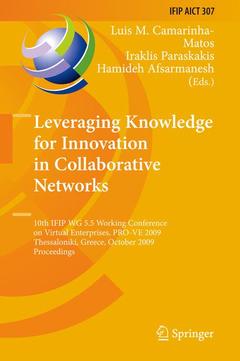Description
Leveraging Knowledge for Innovation in Collaborative Networks, Softcover reprint of the original 1st ed. 2009
10th IFIP WG 5.5 Working Conference on Virtual Enterprises, PRO-VE 2009, Thessaloniki, Greece, October 7-9, 2009, Proceedings
IFIP Advances in Information and Communication Technology Series, Vol. 307
Coordinators: Camarinha-Matos Luis M., Paraskakis Iraklis, Afsarmanesh Hamideh
Language: English
Subject for Leveraging Knowledge for Innovation in Collaborative...:
Leveraging Knowledge for Innovation in Collaborative Networks
Publication date: 08-2016
Support: Print on demand
Publication date: 08-2016
Support: Print on demand
Leveraging knowledge for innovation in collaborative networks (IFIP advances in information & communication technology, Vol. 307)
Publication date: 09-2009
835 p. · 15.5x23.5 cm · Hardback
Publication date: 09-2009
835 p. · 15.5x23.5 cm · Hardback
Description
/li>Contents
/li>
Collaborative Networks A Tool for Promoting Co-creation and Innovation The collaborative networks paradigm offers powerful socio-organizational mec- nisms, supported by advanced information and communication technologies for p- moting innovation. This, in turn, leads to new products and services, growth of better customer relationships, establishing better project and process management, and building higher-performing consortia. By putting diverse entities that bring different perspectives, competencies, practices, and cultures, to work together, collaborative networks develop the right environment for the emergence of new ideas and more efficient, yet practical, solutions. This aspect is particularly important for small and medium enterprises which typically lack critical mass and can greatly benefit from participation in co-innovation networks. However, larger organizations also benefit from the challenges and the diversity found in collaborative ecosystems. In terms of research, in addition to the trend identified in previous years toward a sounder consolidation of the theoretical foundation in this discipline, there is now a direction of developments more focused on modeling and reasoning about new c- laboration patterns and their contribution to value creation. ?Soft issues,? including social capital, cultural aspects, ethics and value systems, trust, emotions, behavior, etc. continue to deserve particular attention in terms of modeling and reasoning. Exploi- tion of new application domains such as health care, education, and active aging for retired professionals also help identify new research challenges, both in terms of m- eling and ICT support development.
1 Co-innovation in Collaborative Networks.- 2 Collaboration Patterns.- 3 Needs and Practices.- 4 Collaboration in Supply Chains.- 5 Teams and Collaboration.- 6 VO Breeding Environments Modeling.- 7 Modeling and Managing Competencies - I.- 8 Modeling and Managing Competencies - II.- 9 Knowledge Management in Collaboration.- 10 Partners Selection.- 11 e-Procurement and Collaborative Procurement.- 12 Trust and Soft Issues in Collaboration.- 13 Processes and Decision.- 14 Management Aspects in Collaborative Networks.- 15 Performance Management.- 16 Agile Business Models.- 17 Service-Based Systems.- 18 Formal Models.- 19 Socio-technical Issues in Collaboration.- 20 Collaborative Work Environments.- 21 Collaborative Networks for Active Ageing - I.- 22 Collaborative Networks for Active Ageing - II.- 23 Collaborative Networks for Active Ageing - III.- 24 Collaborative Educational Networks - I.- 25 Collaborative Educational Networks - II.
© 2024 LAVOISIER S.A.S.

